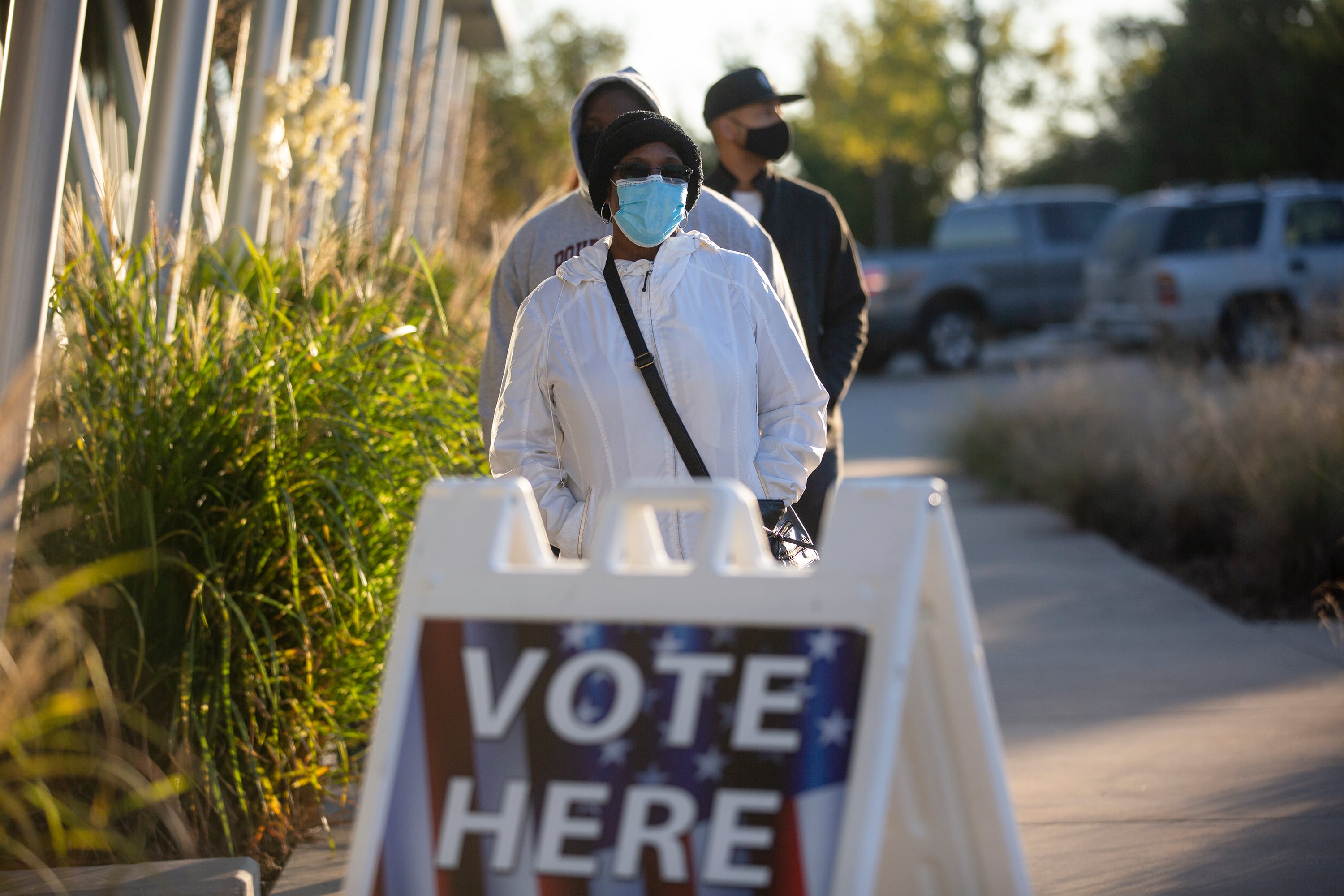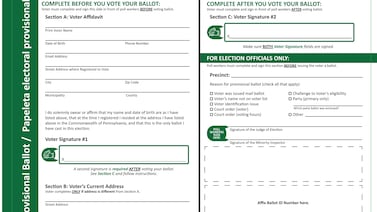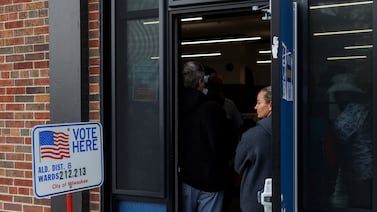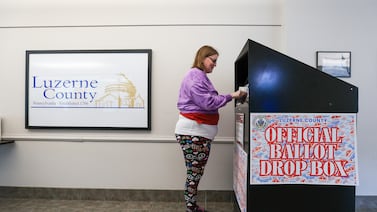Votebeat is a nonprofit news organization reporting on voting access and election administration across the U.S.
When Gillespie County Republicans conduct their primary in March, they will count votes in an ill-advised way: by hand, using scores of volunteers, without any machines.
Even if they can pull off their expensive, labor-intensive plan, they risk being sued by losing candidates or reprimanded by the state. And they may run up a huge bill of unnecessary costs.
“Hand-counting is a recipe for disaster,” said Bob Stein, a political science professor at Rice University and election administration expert. He and most other experts agree on this, and studies back them up: The method is time-consuming, costly, less accurate, and less secure than using machines to tally votes.
The factors that led Gillespie Republicans to this plan are not unique to this rural county of nearly 30,000 people, west of Austin in Texas’ Hill Country. This summer, leaders of the GOP in counties as large as Dallas and as small as Uvalde in South Texas seriously considered hand-counting ballots for their primary elections, according to public records and interviews with election officials.
The phenomenon has been a shock to Stein, who said the effort could undermine confidence in the outcome of the election.
“It will not be reliable nor valid. It’ll cost an enormous amount of money and everyone, every candidate, will be challenging the count,” he said.
Party leadership in larger counties have, so far, resisted a full hand count. In Dallas County, leadership determined it would be impossible with present resources. In Travis County, the local GOP decided on a significantly watered-down hand-counting plan, focusing on a small percentage of primary ballots cast.
Gillespie County Republicans, though, must now recruit and train 100 additional election workers to do the election day tasks that normally fall to county election workers.
Then there’s the enormous job of manually tallying the votes in the roughly dozens of races on the more than 3,000 ballots expected to be cast in the primary, racing against the clock to finish before the state’s 24-hour deadline for reporting results.
But party official David Treibs, a precinct chair who’s been leading the hand-count planning, doesn’t think it will be much of a hassle.
“It’s not anything that’s really complicated. If you go ‘1, 2, 3, 4, 5′ then you can do it,” Treibs, who has no experience hand-counting ballots, told Votebeat. “So it’s not like calculus, you know? If you have a good attention span, then I think most people can do it.”
Ben Adida, executive director for VotingWorks, a nonprofit voting system vendor, which helped the state of Georgia perform a hand-counted audit of the state’s 2020 presidential results, agreed that hand-counting was nothing like calculus. But, he said, it was also nothing like counting to five.
“Imagine being asked to count the number of sheets in a large ream of paper, the kind you get from Staples,” he said. Mistakes aren’t allowed, nor are programs like Excel. Plus, “You have to do it 80 times, because there are 40 contests with 2 candidates each.”
Adida said he understands why hand-counting sounds easy, but once you’ve done it, you quickly realize it’s a daunting process with dozens of steps.
Citing his opposition to hand-counting ballots, Gillespie County GOP Chair Mo Saiidi resigned in September. Days after his departure, the remaining members of county Republican leadership finalized their decision to move forward.
“I could not in good conscience continue presiding over an election using a method that I did not feel was the right process to go through,” Saiidi said. “And I felt it was flawed. I felt it was not well thought out. I didn’t think it was the right thing for the community.”
Things have been spiraling out of control in Gillespie elections for nearly two years. In 2022, the county’s entire elections department quit following harassment and threats from far-right voter fraud activists. This year, voter fraud activists in the county were hosting events featuring well-known conspiracy theorists, pushing for hand counts.
Jim Riley, who was hired earlier this year to lead the decimated elections department, did not respond to Votebeat’s multiple requests for comment.
Bruce Campbell, the Gillespie County Republican Party chair who replaced Saiidi, told Votebeat last week there’s “no effort or willingness” from the party to back out of hand-counting. Texas election administrators see the end of the year as the drop-dead deadline for making such decisions, so it’s likely too late to back out.
“We’re pretty much on that path now,” Campbell said. Volunteers have been practicing hand-counting and he’s certain they’ll be ready on election day. “Everybody that’s going to do it will have done it enough that it won’t be new to them,” he said.
-
Under Texas law, during a primary election — which lasts for two weeks and through the Friday before election day, March 5 — county governments operate early voting, though parties can choose their counting method. On Election Day, the political parties are free to run voting and the counting method in any way they choose so long as it’s legal.
Across the state, county parties select from a variety of options, ranging from contracting the entirety of the process out to the county elections department — to use county-owned voting and tabulation equipment — to retaining complete party control. The operational costs of the primary election varies based on the method of counting the parties decide to use.
In 2020, Dallas County’s Republican Primary — contracting for county services on election day only — cost more than $300,000, records show. This included hourly payments to more than 750 election workers. In Travis, Republicans paid more than $70,000 for 450 hourly workers on election day. In Gillespie, the same day cost more than $8,000, including 45 workers. Experts say these costs would more than double under hand-counting regimes because the method requires more people, in some cases additional polling locations, more space, and far more time.
Records show that Republican county party leaders, including Gillespie County GOP leaders, had only a fleeting notion of what the financial or legal requirements for operating election day voting and tabulation entailed when they began their advocacy for hand-counting.
“Now we need help! We have to run two elections all by ourselves,” Treibs, the Gillespie precinct official, wrote in an August email to the secretary of state’s election division in reference to the primary and the runoff election. The secretary of state’s office received similar emails, calls, and text messages from other county Republican leaders throughout the summer from across the state, records show.
State law requires a minimum of three poll workers at each polling location. To hand-count, at least three additional workers are required. By law, these workers are paid by the hour, and though parties can recruit unpaid volunteers, state officials advise against it to prevent legal disputes. Hand-counting often takes days rather than hours, stretching the limitations of unpaid work. Records show county officials didn’t recognize how quickly costs and responsibilities would mount until they’d already told constituents hand-counting was a real possibility.
“We are choosing to not use any electronic devices during the 2024 election year,” Uvalde County GOP Chair Rhonda Vigil wrote in an August email to the secretary of state’s election division. “Please send me the information needed so I can show anyone that I ask that everything that I’m doing is perfectly legal. Thank you very much for your help and your time. God bless.”
As party chairs have slowly debated their plans for running their primaries, some county election administrators were left to fret.
“Dallas County is anxious to obtain the Secretary of State’s guidance regarding conducting a hand count during a Primary Election,” Dallas County elections administrator Michael Scarpello wrote in an October email. “Not having that information is significantly hampering our efforts to plan for the Primary with both the Democratic and Republican parties.”
Dallas County Republicans would ultimately decide against hand-counting because there was almost no way for the party to recruit and train more than 1,000 election workers and to gather the additional supplies needed to pull it off. After weeks of investigating the feasibility, the party determined it was not possible under current law, Jennifer Stoddard Hajdu, the Dallas County GOP chair, told Votebeat.
For instance, to count by hand in a county that size, the party would have had to purchase 2,400 ballot boxes — special boxes that meet state law requirements to keep ballots secure — that cost $150 each, she said. Stoddard Hajdu says now the party has created a task force to research what changes the Legislature could make to make it easier to pursue a hand count.
Following the various emails and calls with questions the secretary of state’s office received about hand counting, it warned officials that it may not have enough money to reimburse every county party that chooses to hand-count, due to the high costs.
The state currently has about $22 million allocated to reimburse political parties and counties for their primary and runoff election expenses. About $5 million of that comes from candidate filing fees.
At an Austin gathering of more than 500 local party chairs in September, Christina Adkins, the state’s elections division director, warned the costs might quickly spiral out of control.
“It is entirely possible that your costs may exceed our ability to pay for the primary election,” she said, standing behind a podium inside a large hotel ballroom. For over an hour, Adkins went through slide after slide of a presentation detailing rules, procedures, and logistical requirements of a hand count. “If everybody in the state goes to hand-counting, we may not have the funds to pay for everything.”
That caused discomfort and surprise in the room. It also left many of the attendees with more questions. “What if we underestimate the number of people we have to hand-count and we don’t make the 24-hour deadline?” one person asked, referencing the length of time under law each county has to return results.
A Dallas-area activist expressed concern over possible costs. “We need to know how much money you’re going to authorize because the number we have right now is high,” she told Adkins.
Adkins directed every party chair in the room considering a hand count to take a look at how much a previous similar election cost them and to consider the fact that additional workers, additional hours, and additional supplies would be required.
She also did not waver on one point: No county will get a pass on following the law because of the logistical difficulties of hand-counting.
“The law spells out exactly how a hand count has to occur. I cannot give you a dispensation. That’s the word that keeps coming up: ‘Well, can you give us a dispensation to do this a different way?’” Adkins said to the crowd in September. “I cannot. You have to follow state law.”
While other large county Republican parties — such as those in Dallas and Bexar — briefly entertained hand-counting before rejecting it as too costly, Travis County’s GOP resisted calls from both the county and Democrats in the county to make a final choice until this week. Instead of doing a full hand-count — which party leadership had publicly toyed with — they’ll count only mail-in ballots by hand.
There are still several questions left unanswered about how they’ll carry out this plan, and Travis County GOP did not respond to questions about whether they are concerned about potential delays and errors. In an email, party chair Matt Mackowiak said “we have a motivated group that will recruit the necessary workers. We are seeking to use existing state law to increase transparency and confidence in the election. That’s our goal.” .
Given Texas’s restrictive laws around who can legally cast a mailed ballot — mostly voters over the age of 65 and those casting absentee ballots — these ballots will make up only a fraction of primary ballots.
Nonetheless, experts say hand-counting even 1,000 mail-in ballots may be challenging to pull off.
“Depending on when they begin to process mail ballots, hand-counting might delay reporting final vote totals on election night,” said Stein.
The indecision and drama was largely new for Travis County. For years there, Democrats and Republicans have run a joint primary election, sharing the cost of contracting with the county to use its polling locations, equipment, and workers. The months of delays this year, Democrats say, brought their own planning to a standstill.
Katie Naranjo, Travis County Democratic Party Chair said that if Republicans move forward with their plan to hand-count ballots they’ll be tampering with their own election because of the potential delays and errors.
“Republicans have made their intent clear: to erode trust in our election process, and disenfranchise voters – not just Democratic voters, but Republican voters too,” she said in a statement. “While the joint primary contract today does not infringe upon Democrats’ right to hold our own primary election, the process and results of the Republican Primary are still very uncertain.”
Natalia Contreras covers election administration and voting access for Votebeat in partnership with the Texas Tribune. Contact Natalia at ncontreras@votebeat.org






